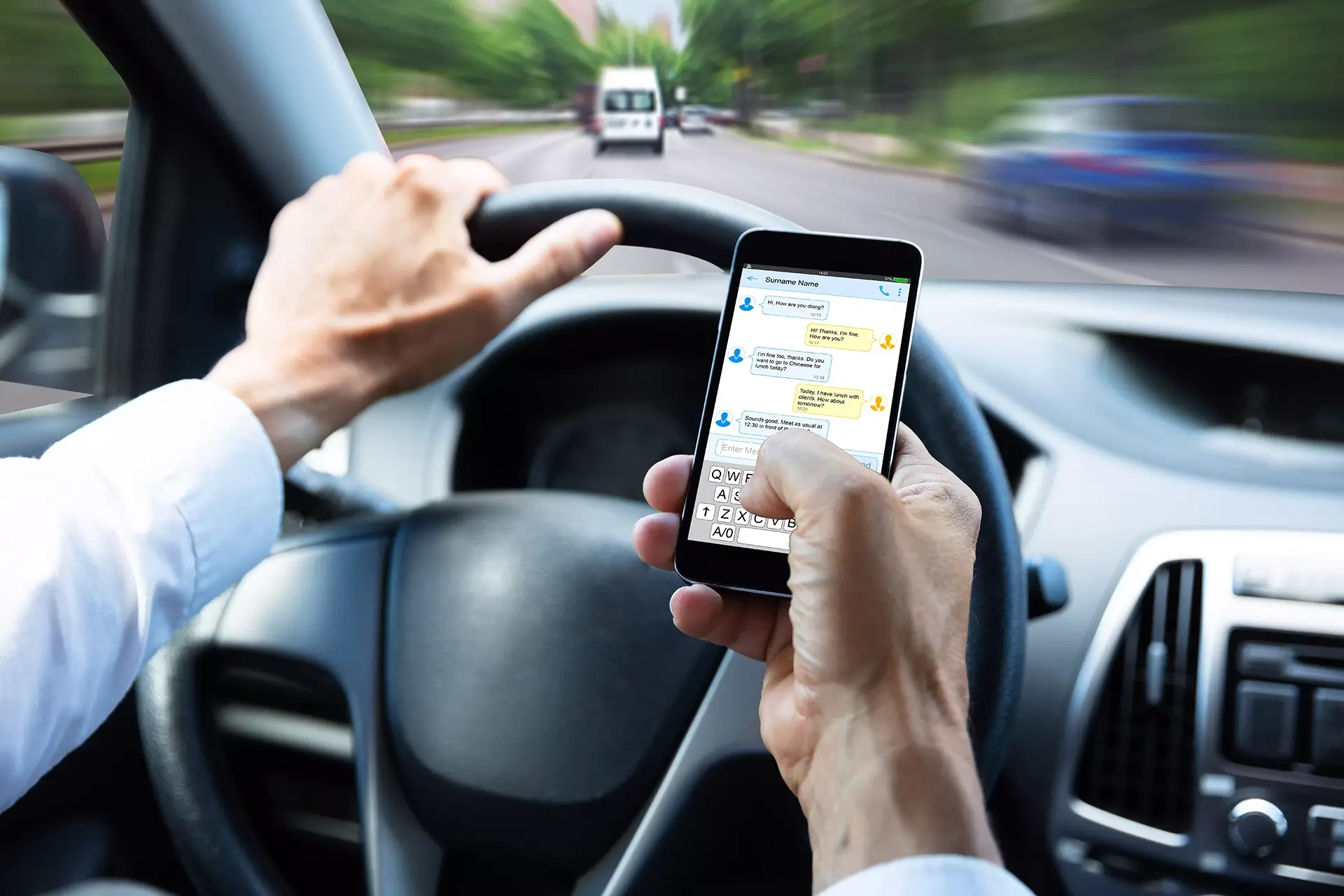Cell Phones Continue to Easily Distract Drivers
Every day, both in Houston and across the globe, drivers find themselves involved in car accidents. Fortunately, most accidents are very minor and involve only vehicle dents and scratches. When a driver collides with another vehicle, building, or object at sufficient speed, however, devastating consequences can occur. Just a few moments of negligent driving can result in totaled vehicles, serious physical injury, or even death.
In today’s device-driven world, distracted driving is one of the most common causes of accidents. Although advances in technology have led to improved safety features like hands-free calling, our social obsession with smartphones still creates a powerful hazard on the road. When a text comes in and there is a strong temptation to respond, a driver may put herself and others at risk of a potentially deadly crash.
Texting While Driving Statistics
Roughly 64% of all traffic accidents in the U.S. involve cell phones. More specifically, as many as 25% of all accidents are caused by texting while driving.1 In fact, data suggests that texting while driving is six times more likely to cause an accident than driving drunk! No matter how skilled a driver you are, the brain isn’t very good at multi-tasking—especially when your eyes aren’t even on the road. On average, it only takes three seconds of inattention for an accident to occur.
These statistics may not seem like much at first glance but think of it this way: In a group of four friends texting one another while driving, statistics suggest that one of them is likely to have an accident. It may be a fender bender, or it may be a fatal crash. Reading or sending a text simply isn’t worth that price.
The Ultimate Form of Distracted Driving
Distracted driving is generally defined as any multi-tasking sort of behavior that might cause a driver to pay insufficient attention to the road. Even simple things like glancing at a map, changing the radio station, or having a conversation while driving can all be considered distracted driving if it diverts your attention enough to cause an accident.
Texting while driving is essentially the ultimate form of distracted driving. First, reading or sending text messages requires the driver to take his eyes off the road and look at the phone. When typing (or pressing a “voice to text” button), the driver also has to take at least one hand off the wheel. The third element of danger is the amount of mental effort and attention required to comprehend incoming texts and compose replies.
Together, these elements reduce the driver’s visual awareness, physical control of the vehicle, and mental focus all at once. This combination of powerful distractions can easily create the perfect storm for an accident.
What Does the Law Say?
Texting while driving is illegal, and the majority of states have established specific laws and penalties regarding texting behind the wheel. In the state of Texas, texting while the vehicle is in motion has been banned for all drivers since September 2017.2
According to the Texas Department of Transportation, first-time offenders of the texting ban will be fined up to $99,3 while re-offenders will be fined up to $200. In Houston, police are taking the issue very seriously; a reported 172 tickets were issued in the first 90 days4 after the 2017 statute went into effect.
How to Prevent and Avoid Texting While Driving Accidents
Whether a loved one, the driver of another vehicle, or you are susceptible to texting while driving, there are things you can do to prevent or avoid texting-related accidents. Consider the following tips to keep you fully focused and safe on the road:
- Keep your phone in your purse, glove compartment, or another spot where you won’t be tempted to use it. If that’s not enough, keep your phone in the trunk or ask your passenger to keep it from you until you’ve reached your destination.
- Let friends and family know that you will not reply to texts while driving. This can relieve some of the pressure of feeling like you need to respond immediately.
- Turn on automatic features that prevent text/app use while driving if you have them.
- If you see another driver texting—especially if she is moving erratically—keep your distance and stay alert. If an accident occurs, you’ll be in the best position to react quickly and defensively.
- If you can’t seem to stop texting despite knowing the risks and legal consequences, don’t be afraid to ask for outside help. A professional counselor can help you develop healthier texting habits to improve your life and keep you safe on the road.
The Importance of Getting a Lawyer After an Accident
After a car accident, it’s common to feel confused and anxious. From talking with the other driver at the scene and getting a police report to dealing with insurance claims, auto repairs, and medical care for injuries, crash victims face an onslaught of stressful details.
Things become even more frustrating when disagreements about fault and insurance coverage lead to unfair conclusions and poor compensation. No matter the case, it’s important to have a qualified Houston personal injury attorney on your side.
An experienced car accident attorney can help you navigate the legal aspects of your case, identify what your responsibilities are, and fight for your right to be made whole again after your accident. As a U.S. citizen and the victim of a crash caused by texting and driving, you are absolutely entitled to fair compensation. A good lawyer will build a strong case on your behalf and help you recover the damages you deserve.
Hurt in a Crash Caused by Texting While Driving? We Can Help!
At Johnson Garcia LLP, we’ve been helping victims of all kinds of personal injury cases seek the fair treatment and compensation they deserve. With more than 30+ combined years of legal experience and a running total of over $100,000,000 recovered for our clients, we are a trusted resource for accident victims in Houston, TX and throughout the state.
If you’ve been involved in a texting and driving accident, fill out our contact form or call 832-241-5465 for your free initial consultation today.
Sources:
- https://www.cdc.gov/motorvehiclesafety/distracted_driving/index.html
- https://www.ncsl.org/research/transportation/cellular-phone-use-and-texting-while-driving-laws.aspx
- https://capitol.texas.gov/tlodocs/85R/billtext/html/HB00062I.htm
- https://www.click2houston.com/news/2018/01/10/how-is-houston-enforcing-texting-while-driving-law/


